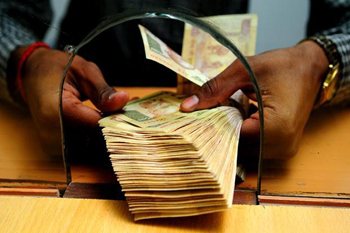New Delhi, Feb 1: The Income Tax department has identified 18 lakh people who have made 'suspicious' cash deposits post demonetisation, including those having deposited over Rs 5 lakh, and will send emails and SMSes seeking explanation about their source of funds.

The department today launched 'Operation Clean Money' project under which CBDT, with data analysis and profiling of assessees, will send e-communications to people whose cash deposits post November 8 note ban do not match their income.
"Operation Clean Money/Swachh Dhan Abhiyan is a programming software which will be used to get answers on all the deposits made and after preliminary answers from the people. Then only, if need be, we would take legal action against those people," Revenue Secretary Hasmukh Adhia said.
Central Board of Direct Taxes (CBDT) Chairman Sushil Chandra said 10 days' time would be given to people to reply to the e-communication and replies can be filed by logging on to the e-filing portal of the Income Tax department.
"In the initial phase, we are putting data of those persons who have deposited Rs 5 lakh or more and deposits between Rs 3 lakh and Rs 5 lakh of suspicious nature and who have poor tax compliance after November 8," Chandra said.
Initially, this will cover 18 lakh tax payers whose data will be uploaded on e-filing portal. These people while filing reply have to explain to tax department the sources of deposit.
Chandra said that tax department has compiled huge data which shows that there are over 1 crore accounts where above Rs 2 lakh money have been deposited and involves unique PAN of 70 lakh persons.
"We have compared these vast data with the income profile, turnover and the various other particulars of income available in the income tax data bank. In the first phase where the deposits in account are not matching with our data, we are putting the same on our e-filing portal seeking explanation of source of income," he said.
Chandra said the intention of the scheme is to avoid any harassment to the tax payer, they need not come to office and online verification would be completed.
"Swachh Dhan Abhiyan is a continuous exercise to widen and deepen the tax base. All the accounts in which money has been deposited will be tracked and we have hired the data analytics and we will identify the ultimate beneficiaries even in layered accounts," he said.
Adhia said Operation Clean Money will ensure there is no physical contact between the assessee and the tax department officials as questions will be asked online.
"People have been fearing there will be Inspector Raj as tax department will have data about all the deposits. But, the new programing software will enable e-verification of all bank deposits during the period of demonetisation," he said.
The initial phase of the operation involves e-verification of large cash deposits made from November 9 to December 30, 2016.
"Initially this will cover 18 lakh tax payers whose data will be uploaded on e-filing portal. No source of deposit will be asked from small taxpayers who have genuine compliant savings," Chandra said.
Data analytics has been used for comparing the demonetisation data with information in databases. In the first batch, around 18 lakh persons have been identified in whose case, cash transactions do not appear to be in line with the tax payer's profile, CBDT said in a statement.
The tax department has enabled online verification of these transactions to reduce compliance cost for the taxpayers while optimising its resources.
A detailed user guide and quick reference guide has also been made available on the e-filing portal to assist the taxpayer in submitting online response.
In case of any difficulty in submitting online response, help desk can be reached at 1800-4250-0025, CBDT said.
Data analytics will be used to select cases for verification, based on approved risk criteria. If the case is selected for verification, request for additional information and its response will also be communicated electronically.
"The response of taxpayer will be assessed against available information. In case explanation of source of cash is found justified, the verification will be closed without any need to visit Income Tax Office," it added.
The verification will also be closed if the cash deposit is declared under Pradhan Mantri Garib Kalyan Yojna (PMGKY).
The tax amnesty scheme PMGKY provides for 50 per cent tax on income being disclosed and also parking of a quarter of such income in a zero-interest bearing bond for four years.








Comments
Add new comment